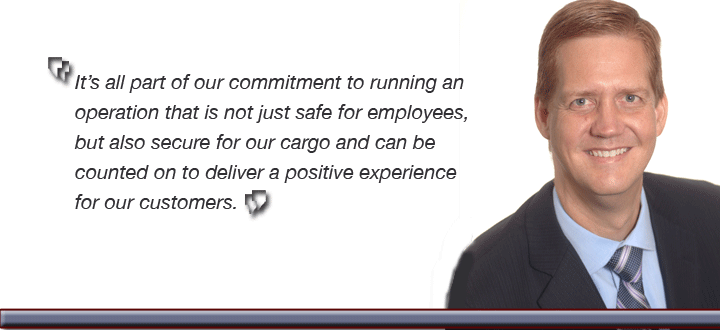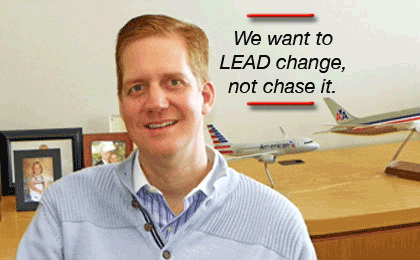

We caught up
with President American Airlines Cargo Jim Butler recently to
find out how 2015 has panned out so far for AA Cargo. FlyingTypers was also curious as to the things that merit interest and attention
from a top cargo executive at the world’s biggest airline.
Collaborative Effort Tops All
“For the company as a whole,
we’ve been focusing on engaging our employees so they
have the tools and technology needed to do their jobs well.
This means, running a safe, reliable and compliant operation
our customers can trust.
“When we reorganized last
year, we repositioned cargo under the operations organization
at American and it has really started to pay dividends.
“Teams around the company
work much more collaboratively to improve the operation and
make recommendations for where we can evolve our processes and
make positive change.
“This level of cooperation
starts with a focus on safety, but will also optimize our performance
across the operation.
“On top of that, the airline
is investing in the facilities and equipment our cargo teams
need to be successful.
“Just this summer, we’ve
opened our PHL cold chain facility, expanded our footprint in
key cities, invested in our DFW hub, and are now taking delivery
of the first of a long list of new equipment that are more reliable
and efficient.
“It’s all part of
our commitment to running an operation that is not just safe
for employees, but also secure for our cargo and can be counted
on to deliver a positive experience for our customers.”
Next
on the Agenda
“As far as what excites
me for the remainder of the year, I would say the focus is on
being our customers’ preferred choice in air cargo.
“We continue to talk about
how our network has grown—and we should, since there’s
nothing more valuable than being able to offer new connection
points for cargo customers, but we are also very focused on
developing the industry’s best customer experience, one
that helps drive partnerships and customer loyalty well into
the future.
“That means being easy to
do business with in all aspects, from booking to billing and
everything in between.
“As an example, in the not-too-distant
future, our customers will see enhancements to the way they
view and receive information about their shipments, and we are
confident they will be very happy with the results.
“We’re looking to
make similar improvements to all aspects of our business, with
the customer’s needs being front and center,” Jim
Butler said.
The
Butler Did It
Jim Butler came to air cargo via
a somewhat circuitous path, one he calls “non-traditional.”
Perhaps the most fascinating thing about the air cargo industry
is how many of its people arrive at their jobs having diverged
from other careers. Air cargo may just be the melting pot of
industries. Given these non-traditional pathways, we’re
always curious as to whether air cargo’s inhabitants still
find their careers interesting and fulfilling.
“I was focused on American’s
bankruptcy and the merger with US Airways before joining cargo
in late 2013, so perhaps I came to cargo in a more non-traditional
way.
“However, is it still interesting?
I am just getting started!
“In many respects, the cargo
side of the airline is more complex and there was a bit of a
steep learning curve, but I’m incredibly proud of the
team who persevered through the integration and other changes
that have allowed me quickly up that curve.
“Given that we operate as
a complete business, having all of the individual components
in one organization is exciting and will ensure we have our
work cut out for us for many years to come.
“So, if I had to choose
a new job, air cargo would certainly be at the top and, with
enthusiasm, a renewed strategic focus, new investment, and a
strong vision for cargo at American, we are recruiting and developing
some of the top talent from other parts of company as well as
the outside.”
Family
Funnies
 Serving
as Homers to the air cargo Iliad, we see more than just the
day-to-day working activities of air cargo’s driven community.
And as a family-run business, we know how easily family and
work can overlap. We wonder how one of the top people in air
cargo carves out family time from his busy schedule. Serving
as Homers to the air cargo Iliad, we see more than just the
day-to-day working activities of air cargo’s driven community.
And as a family-run business, we know how easily family and
work can overlap. We wonder how one of the top people in air
cargo carves out family time from his busy schedule.
“Let me be honest—there
is nothing more important to me than my family. My wife and
two children are incredibly supportive and have allowed me to
devote the time, energy, and travel necessary to focus on the
task at hand.
“But we also like to travel
together. Earlier this year, we had a funny moment because I
quietly took them on a business trip for the first time when
I traveled to Shanghai for the IATA Cargo Conference so they
could sightsee while I worked.
“Well, that worked great
until their picture came out in Flying Typers on the
second morning.
“My kids felt like little
celebrities when they walked through the lobby! As for favorite
cities, we really are partial to London where we lived for two
years so we try to go back often. And, while I try not to steer
my children toward any particular profession, what drives me
to transportation is how incredibly dynamic and competitive
it is.
“I often tell people that
more happens in 6 months in this industry than over 6 years
in most others.”
The Airline Forwarder Relationship
“Airlines and forwarders
must continue to evolve relationships to explore how we can
provide more integrated solutions to the shipper community.
“We have explored this and
it has been really successful for specialty products like ExpediteTC.
“When a single shipment
can literally be worth millions, shippers are more interested
in understanding the specific processes the airline has in place
in order to become comfortable with handing over the shipment.
“Our goal is to do everything
in our power—including working with our partners—to
ensure all time- and temperature-sensitive products maintain
the same level of quality and effectiveness from the time they’re
accepted to the moment they reach the patient in need.
“The best way to ensure
this success is to get together before the first shipment is
accepted and lay out the specific roles, responsibilities and
processes that each party will use to succeed.
“Honestly, if I was shipping
that type of product, it is the least I would require. Once
there is agreement, we can deliver the service customers have
come to expect.”
Building
Global Markets
“We continue to focus on
our transpacific network, where we’ve seen significant
capacity growth in the last few years.
“We now have 11 daily departures
out of Hong Kong, Seoul, Shanghai, Narita, and Beijing and we’re
excited to add service to Sydney from Los Angeles later this
year. So Asia is now an even more integral part of our network,
and the real strength comes from our ability to move cargo from
Asia beyond the U.S. gateways and into Latin America, and vice
versa. So, even as we see some weakness in demand around the
globe, we view this as a unique opportunity, one that we will
continue to develop.”
The Paperwork Jungle
and e-AWB
“In 2014, we intentionally
set modest goals for ourselves given our integration, simply
because we had a conflicting objective of providing a seamless
integration of two major divisions, and we didn’t want
to introduce a major change into the business during that time.
Now, we are able to set loftier goals and are incredibly excited
to have the opportunity to direct our focus on becoming a paperless
operation—and are really challenging our organization
to seize the momentum. Not only is this a strategic part of
our path toward more efficient, personalized and consistent
interactions with our customers, it’s another initiative
that adds to our overall, companywide goal of reducing our carbon
footprint. But I won’t be satisfied until we complete
the transition to e-freight.”
“Encouraging and supporting
participation and adoption from all stakeholders, through a
standardized process across the industry, would greatly help
to accelerate the paperless process. It’s a simple statement,
but can lead to a variety of positive opportunities for our
colleagues, partners, customers, and us. Because there is not
enough standardization, the eAWB initiative is literally thousands
of small, local projects in cities around the world, which slows
the ability to see rapid change. Also, due to this, you have
to recognize that it will take resources to be successful.“
Talks
To The Animals
Given the recent upheaval around
“Trophy Cargo,” we were curious as to how AA Cargo
was responding to the highly-politicized situation.
 “Obviously,
this is a case where we made the swift and easy decision to
do what we thought was right. “Obviously,
this is a case where we made the swift and easy decision to
do what we thought was right.
“So, as of August 3 of this
year, we officially do not accept any shipment of buffalo, elephant,
leopard, lion, or rhinoceros trophies.
“This also follows from
having banned the shipment of shark fins earlier this year.
“Ultimately, we are committed
to evaluating our policies and will continue to consider swift
changes where we deem appropriate.
“We have over 50 years of
experience shipping [live] animals, and have maintained a strong
commitment to ensuring the welfare of all animals entrusted
to us. No matter the animal, we follow special steps to make
sure their travel is as comfortable as possible—because
we know our customers’ pets aren’t just another
piece of cargo, they’re part of the family. For non-domesticated
animals, we have worked with wild, zoo, and exotic animals being
shipped for safe, humane reasons, such as a movement to a sanctuary,
preserve or rehabilitation center.”
Pharma
To Fashion & Back Again
“Our pharma business has
been a big focus for us this year with the increasing demand
for important vaccines and medications across the world. It
is just one of the sectors where we don’t leave anything
to chance—and we’ll continue making valuable investments
in our infrastructure and people to make sure we provide our
customers with the best service available in the industry.
“This brings me back to
our fully dedicated PHL cold chain facility, which was a huge
step in enhancing and growing our temperature-sensitive business.

The American Airlines Cargo Pharmaceutical
& Healthcare handling facility at Philadelphia International
Airport has an independent power backup system, and significant
capacity for Controlled Room Temperature (CRT: +15°C
to +25°C) as well as a refrigerated cold room (COL:
+2°C to +8°C). There is also a dedicated active
container management (ACM) area with plug-in stations for
up to 30 equivalent RKN electronic-type units. |
“With the many routes we
now have available flying in and out of Europe, we have seen
an increased demand for the shipping of more specialized products,
such as high-fashion items, textiles, and auto parts. We expect
this business to continue growing and anticipate the transport
of more pieces from high-end brands and automotive manufactures
to gain momentum as we continue to build out our fleet and expand
the network.”
Bettering
Air Cargo
 “Education,
in many aspects of our lives, is the key to growth and new opportunities.
Training and educating our employees, from their first day on
the job to the day they retire, remains a highly visible and
supportive part of our company’s vision. Looking at the
industry as a whole, we can focus on: “Education,
in many aspects of our lives, is the key to growth and new opportunities.
Training and educating our employees, from their first day on
the job to the day they retire, remains a highly visible and
supportive part of our company’s vision. Looking at the
industry as a whole, we can focus on:
• Paying attention to related markets and industries and
the advancements they are investing in—as those are early
indicators of how air cargo will be expected to evolve.
• Understanding and looking to leverage technologies that
already exist in related supply chain/logistics and even consumer
driven arenas—customers (whether b2b or b2c) have similar
expectations in terms of ease, convenience and responsiveness.
• Data, data, data – the way we manage it, share
it, and leverage it in the future is critical to ensuring that
the talent in our organization can move us in the right direction.
• Educating staff and new hires continually—again,
continuous growth is the key to long-term success.
“The minute your organization
stops learning and gets comfortable with the way things are
done is when the world passes by at a pace you can’t keep
up with.
“And that’s not what we
want—we want to LEAD change, not chase it.
“As I’ve mentioned before,
the key to an experience our customers deem excellent is engaged
and well-informed employees.
“By focusing on aligning tools
and modernizing processes on a global scale, you create an environment
of collaborative teamwork and mutual respect within a culture
of employees who want to do their jobs well. Modernization of
tools might include anything from new ground equipment to the
implementation of new automated systems, which can assist in
the elimination of errors.
“It’s about setting up
employees for success by giving them the time and tools needed
to deliver.
“At American, we’ve just
completed a global training course with our customer-facing
employees to boost the interpersonal relationship skills which
I find critical to our long term success.
“This is, and will always be,
a business built on relationships.
“We pride ourselves on having
strong personal relationships with our customers and knowing
how important engagement is to maintaining that two-way conversation
around industry trends and service improvements.
“We are not always going to get
it right, but a strong partnership can overcome those challenges
as they come up.”
Looking
At Tomorrow
“At American, we’re not
just investing in our daily operation and current employees,
we also make sure to look ahead and do our part to help improve
on our future by supporting those who, one day, will fill our
shoes and continue our legacy.
“Most recently, our company’s
education foundation awarded first-generation college students
of American employees merit-based scholarships.
“These were based on financial
needs, academic achievement, extracurriculars, and community
involvement.
“We’re very proud of our
company and employees, and find motivation in the next generation
who will continue our work in this globally important industry.
“We have a great story to tell
and have a strong value proposition for new, energetic, innovative
team members and each one of us in the industry should prioritize
telling this story and attracting this new talent.
“The industry should be proud
of the unique opportunity we have to work in cargo and open
up that opportunity to a more diverse group of talent.
“Until air cargo recognizes that
the right balance between people with institutional knowledge
and those with fresh perspectives is critical to an engaged,
driving workforce, our industry will not win.”
Geoffrey
|



